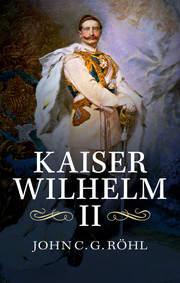Book contents
- Frontmatter
- Dedication
- Contents
- List of figures
- Acknowledgements
- Preface to the English edition
- Preface to the German edition
- Acknowledgements
- Overview: Wilhelm the Last, a German trauma
- Part I 1859–1888: The Tormented Prussian Prince
- Part II 1888–1909: The Anachronistic Autocrat
- Part III 1896–1908: The Egregious Expansionist
- Part IV 1906–1909: The Scandal-Ridden Sovereign
- Part V 1908–1914: The Bellicose Supreme War Lord
- 17 The Bosnian annexation crisis (1908–1909)
- 18 The ‘leap of the Panther’ to Agadir (1911)
- 19 The battlefleet and the growing risk of war with Britain (1911–1912)
- 20 Doomed to failure: the Haldane Mission (1912)
- 21 Turmoil in the Balkans and a first decision for war (November 1912)
- 22 War postponed: the ‘war council’ of 8 December 1912
- 23 The postponed war draws nearer (1913–1914)
- 24 The Kaiser in the July crisis of 1914
- Part VI 1914–1918: The Champion of God’s Germanic Cause
- Part VII 1918–1941: The Vengeful Exile
- Notes
- Index
18 - The ‘leap of the Panther’ to Agadir (1911)
Published online by Cambridge University Press: 05 September 2014
- Frontmatter
- Dedication
- Contents
- List of figures
- Acknowledgements
- Preface to the English edition
- Preface to the German edition
- Acknowledgements
- Overview: Wilhelm the Last, a German trauma
- Part I 1859–1888: The Tormented Prussian Prince
- Part II 1888–1909: The Anachronistic Autocrat
- Part III 1896–1908: The Egregious Expansionist
- Part IV 1906–1909: The Scandal-Ridden Sovereign
- Part V 1908–1914: The Bellicose Supreme War Lord
- 17 The Bosnian annexation crisis (1908–1909)
- 18 The ‘leap of the Panther’ to Agadir (1911)
- 19 The battlefleet and the growing risk of war with Britain (1911–1912)
- 20 Doomed to failure: the Haldane Mission (1912)
- 21 Turmoil in the Balkans and a first decision for war (November 1912)
- 22 War postponed: the ‘war council’ of 8 December 1912
- 23 The postponed war draws nearer (1913–1914)
- 24 The Kaiser in the July crisis of 1914
- Part VI 1914–1918: The Champion of God’s Germanic Cause
- Part VII 1918–1941: The Vengeful Exile
- Notes
- Index
Summary
With the death of his uncle King Edward VII on 6 May 1910 Wilhelm II’s hopes were revived for a rapprochement between Germany and Britain that would at last enable the German Reich to achieve the world status marked out for it by ‘Providence’. In that year the Kaiser explained his racial vision for the future to David J. Hill, the American ambassador in Berlin: the English, he claimed, were already on the downhill road while his own empire was advancing.
We do not want their colonies nor the dominion of the sea, we only want to have our rights respected. Germany is now almost as rich as England. […] What we want is an equal chance. They have tried to hold us up as a menace to Europe, but we have menaced no one. They have tried to array Europe against us, but their entente is weakening. As for the Latins, they have had their day. I do not believe the Slavs are to be the leaders of the future. Providence has designs, and it would not be a compliment to Providence to believe that it is to the Slavs and not to the Germanic race that Providence looks for the civilization of the future. No, it is the Germanic race, – we here in Germany, the English and the Americans, – who are to lead the civilization of the world.
In eager anticipation of the forthcoming visit of the former US president Theodore Roosevelt to Germany, Wilhelm went into raptures about a ‘coming together of the Teutonic-Anglo-Saxon countries’. ‘The Germanic + Anglo Saxon Races combined will keep the world in order!’ he wrote enthusiastically to Roosevelt after the visit, sending him photographs of the two of them together on manoeuvres.
- Type
- Chapter
- Information
- Kaiser Wilhelm IIA Concise Life, pp. 125 - 128Publisher: Cambridge University PressPrint publication year: 2014

